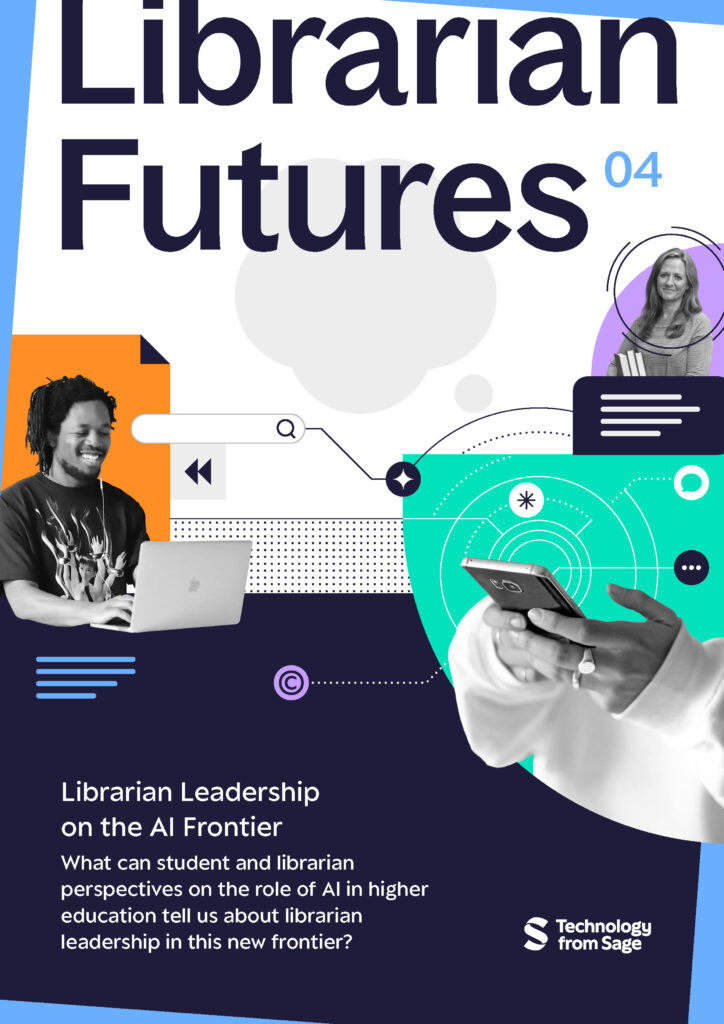We recently hosted a webinar introducing Lean Library Workspace—the latest development in our mission to redefine and amplify the power of the academic library to advance teaching, learning and research. Lean Library Workspace transforms Lean Library into the ultimate end-to-end research tool.
Library professionals from around the world joined us, sharing their experiences, challenges and perspectives. Through polls and discussion, one message was clear: students and researchers are expected to navigate too many tools and libraries need to provide more streamlined and integrated support.
Lean Library Workspace takes the library and its users beyond the access, discovery and guidance part of the research workflow that Lean Library currently supports, through to reference management, project collaboration and authoring work. It connects the browser extension to a new Lean Library Workspace website and accompanying Google Docs and Word plug-ins.
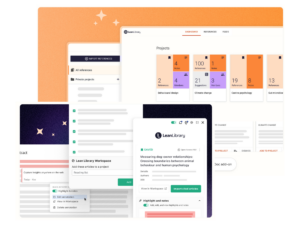
One of the strongest themes to emerge from our webinar polls was tool fatigue. Students and researchers are often expected to juggle multiple platforms—one for access, another for reference management, a third for collaboration, and so on.
When we asked, “How many new tools do students and researchers need to learn to succeed academically?”, most respondents said between three to eight. That’s a steep learning curve, especially for new students. And it often leads to confusion about what the library supports, or where to go for help.
This underlines the value of an all-in-one tool like Lean Library Workspace—one that simplifies the research journey by bringing together discovery, access, citation, collaboration, and authoring into one seamless tool. The result? A more focused, less fragmented experience, helping students and researchers focus on their work rather than struggling to manage multiple tools and platforms.
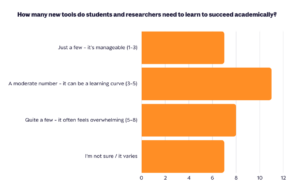
Libraries are already doing a great deal to support research skills through:
But even with this support, users often remain unaware of what resources and services are available through the library or how to access them. Lean Library helps bridge this gap by delivering support at their point of need—whether on Google Scholar, Wikipedia, or even ChatGPT.
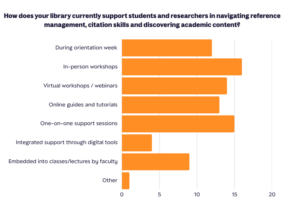
📌Tip: Take advantage of Lean Library’s promotional toolkit—including a Lean Library Workspace LibGuide, videos, flyers, and more—to help build awareness of Lean Library on campus. Group deployment is also available and can increases engagement significantly.
Our polls uncovered key gaps in current library offerings:
This highlights a growing need for tools that work across the entire research workflow—just like Lean Library Workspace does.
When we asked, “Where do your students and researchers most often need support in their research workflow?”, responses consistently highlighted a few key areas:
These challenges reflect the complex nature of the modern researcher workflow. Lean Library supports users in each of these areas without requiring them to leave their workflow or learn yet another platform.
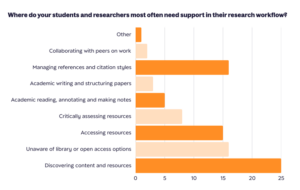
According to attendees, an all-in-one tool like Lean Library Workspace could offer a wide range of benefits, including:
With our librarian dashboard, Lean Library Workspace also equips libraries with valuable analytics to inform decision-making and demonstrate the library’s impact.
The answer: everyone! According to poll respondents, undergraduate students, postgraduate researchers, faculty, and librarians all stand to gain from a tool like Lean Library Workspace.
It simplifies the research journey, increases efficiency, boosts productivity, saves money and time, drives usage of resources, and brings more visibility to the library.
“I love it more than Papers and EndNote. It’s intuitive, quick, and easy.”
— Ernesto Perez, Postdoctoral Fellow, NIH
“The best scholarly tool I’ve seen so far in terms of its practical usage!”
— Shervin Safavi, PhD student, Max Planck Institute
Lean Library Workspace isn’t just another tool. It’s a direct response to the increasing complexity of today’s digital research workflows. It removes the challenges of jumping between platforms and brings your library’s resources and service into a single user-friendly experience.
Lean Library puts the library at the heart of every research journey. Providing an uninterrupted research rhythm to your users. Stop requiring students and researchers to find the library—let the library come to them.
Interested in a personalised demo? Request one here or email us at info@technologyfromsage.com.
🔗 Explore Lean Library Workspace today: workspace.leanlibrary.com
New Technology from Sage Report Explores Librarian Leadership in the Age of AI May 20, 2025Technology from Sage has published the fourth instalment in its acclaimed Librarian Futures series: Librarian Leadership on the AI Frontier. The report explores how artificial intelligence (AI) is reshaping the academic research journey—and the vital role librarians can play in guiding its responsible use.
Drawing on global surveys of over 1,000 students and 300 librarians, the findings uncover a complex relationship between confidence, capability, and trust in the academic use of AI. While over half of the students reported using AI tools like ChatGPT in their research, just 8% say they’ve received support from their librarian in doing so. This presents both a challenge and an opportunity: students overwhelmingly trust their librarians, with more than half saying they’d feel more confident using AI tools if recommended by them.
